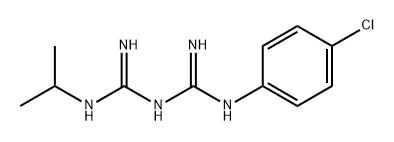500-92-5
 500-92-5 結(jié)構(gòu)式
500-92-5 結(jié)構(gòu)式
基本信息
氯胍-D6鹽酸
N-(4-氯苯基)-N'-(異丙基)-雙胍
PROGUANIL
paludrine
Aids008307
Aids-008307
chlorguanide
chloroguanide
ChlorguanideCl
Chlorguanide-D6Cl
Chlorguanide-d6 HCl
物理化學(xué)性質(zhì)
常見問題列表
Proguanil per se has only weak antimalarial activity
in vitro
(IC
50
=2.4-19 μM), and its effectiveness depends on the active metabolite Cycloguanil (IC
50
=0.5-2.5 nM). The Cycloguanil is a dihydrofolate reductase (DHFR) inhibitor. The combination of Atovaquone and Proguanil is synergistic
in vitro
. Both drugs also have activity against gametocytes and pre-erythrocytic (hepatic) stages of malaria parasites.
Proguanil acts as a biguanide rather than as its metabolite Cycloguanil (a parasite dihydrofolate reductase [DHFR] inhibitor) to enhance the Atovaquone effect. Proguanil-mediated enhancement is specific for Atovaquone, since the effects of other mitochondrial electron transport inhibitors, such as Myxothiazole and Antimycin, are not altered by inclusion of Proguanil.
5-HT
3
receptor responses are reversibly inhibited by Proguanil, the metabolite 4-chlorophenyl-1-biguanide (CPB) and the active metabolite Cycloguanil (CG), with an IC
50
of 1.81, 1.48 and 4.36 μM, respectively.
Proguanil (p.o.; 2.9 mg/kg body weight; daily for 5 days and 6 weeks respectively) shows mild degenerative changes for five days, while shows severe degenerative changes for six weeks in wistar strain albino rats.
Serum testosterone level is significantly decreased for proguanil treatment rats.
Administration of Malarone (atovaquone and proguanil) to experimentally
B. gibsoni
infected two dogs in chronic stage and three dogs in acute stage results in decrease in parasitemia, and clinical improvements are observed.
